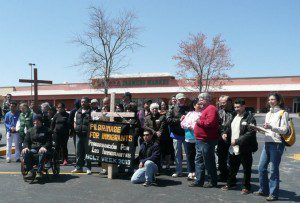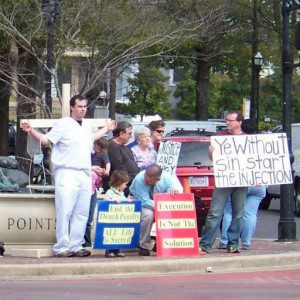![Rabboni by Gutzon Borglum (1909) [Control #IAS 76005124]](https://farm5.staticflickr.com/4044/5169702690_eebc1acc7e.jpg)
Easter Day is over.
But Easter has only just begun.
For 50 days, Easter continues, according to the Christian calendar, and those 50 days represent a singular great feast celebrating God’s triumph of love over the violence and hate that throttles our world.
Even though the season lasts for almost two months, we often forget about Eastertide as soon Easter Day ends. Once the chocolate is consumed and once the last hardboiled Easter egg is finally found in the place no one remembers hiding it, we quickly return to the regular rhythm of the world, scarcely changed.
This, of course, isn’t true about other Christian seasons, such as Advent and Lent. We are often careful and meticulous in our Advent and Lenten observances, disciplines and fasts. In Advent, we wait for the in-breaking of God in our lives, because so much of our lives are indeed spent waiting for God to show up. In Lent, we fast, denying ourselves pleasures and practices in order to draw ourselves closer to God.
In these seasons, we strive toward God, whether through our patience or our penitence, and understand and expect the hard spiritual discipline involved in both these seasons.
But there is hard spiritual work to do in Easter, as well. However, rather than practicing patience and penitence, Easter asks us to exercise our imaginations.
Sadly, in our modern world, the discourse surrounding Easter has been reduced to whether the resurrection was an historical or a metaphorical event, a development that contributes to the winnowing of Easter from 50 days to a singular day in our minds. Indeed, this simplistic, dualistic conversation has worried many of us — fundamentalists, conservatives and progressives. But the modern conversation about Easter and resurrection is a conversation that fundamentally lacks imagination, and imagination — not the fundamentals of faith — is what Easter is all about.
Frankly, I don’t care if you believe Jesus was literally or metaphorically resurrected. And neither does Easter. I find it laughable we try to reduce the power of Easter to a proposition, as if the resurrection could be a prostitute for our petty debates about faith.
A better conversation would involve a discussion about whether Easter is true rather than whether it is historical. Because Easter invites us to so much more. It invites us to live as if death is not.Or perhaps more precisely, it invites us to live as if the power of death, the powers that be, the violence that reigns our world has been broken. And in a world in which death and violence surround us at all times, this takes a prophetic and profound imagination.
Rather than worry whether Jesus literally folded up his bed clothes and walked out of the grave; rather than worry whether Jesus was mystically and metaphorically with the disciples on the road to Emmaus when they broke bread together; rather than worry about our doubt or our inability to believe, perhaps it is finally time to start worrying about what Easter is all about.
Debating Easter’s historicity is a fundamental distraction that prevents Christians from engaging from the terrifying prospect of what Easter means for us.
Easter is costly for Christians.

Easter invites us to imagine a world without fear. It invites us to imagine what our world would look like if violence and retribution were indeed signs of weakness rather than strength and might makes right. It invites us to imagine that violence and death and the Powers that Be do not have the last word. It invites us to imagine the transformative, mountain-moving power of nonviolence and grace, of faith, hope and love.
In fact, Easter proclaims that this is true. Easter proclaims this is the reality of the world God has created, and that this had indeed always been the reality in which we live. God has always been calling to us, through prophets and sages of the past, to live as if love, not hate and violence, were the forces that matter most in the world. Easter isn’t true because Jesus was resurrected. Easter is true because it has always been true that God loves us, because it has always been true that God hasn’t been interested in controlling the world with war, violence and oppression like the Powers that Be, but in transforming it with love and the giving away of power.
Easter has always been true, from the beginning of time. It is the powers of the world that have done their goddamned best to veil that reality through guns, swords, crosses and a culture of created enemies. Easter invites us to remove to veil and see the world as it is intended, to behold the reality that exists behind the curtain of oppression and the fog of war. It invites us to open our eyes and see brothers and sisters where we had once seen enemies, to see hope where we had once seen despair, to see life in a world flooded by death.
It invites us, as my friend Mark Sandlin does, to scream with God, with all our holy breath, “No! Death has not the last word! Violence has not the final say! Might does not make right!”
And Easter asks us how we will then live our resurrected lives.
Easter invites us to remove the grave clothes that bind us, to walk out of the tomb in which we live and only see the way of death, and begin to move into the world in new and profound ways — the way of resurrection in which we walk through doors that had previously been locked and barred through fear and despair.

Easter invites us to start living, and living fully, and living fully for others rather than living for ourselves, for security, for our small portion of domination of others in the midst of our own oppression.
Easter is costly.
Easter asks us not to perform penance, but to practice hope.
Easter asks us not to sit patiently for God to arrive, but to see that we have overlooked God already among us, in the strangers on the road, on the beach, in our midst, and in broken, life-giving things like bread.
Easter asks us not to believe the resurrection, but to imagine it, to practice it.
What would it look like if we imagined a world in which Easter is true, a world in which way of death, violence and oppression had been broken and robbed of their power?
To live without the fear of death, the pain and alienation of dying.
To live without the resignation that the Powers That Be will, at the end of the day, still rule the day.
To live without the hopelessness that the cycle of violence will never stop spiraling out of control.
To live without that powerless feeling of a mute carrying a bullhorn, shouting good news.
To live without that doubt that Easter, regardless of its historical truth, is nevertheless a lie.
To live as if Easter is true.
Can we begin to imagine it?
 What would it look like if we summoned the Easter courage to confront the lies that the domination systems of the world tell us about oppression, violence, retribution and why their ongoing crucifixion of the world keeps us safe and free?
What would it look like if we summoned the Easter courage to confront the lies that the domination systems of the world tell us about oppression, violence, retribution and why their ongoing crucifixion of the world keeps us safe and free?
We have 50 days to begin to imagine a world transformed. No, that’s not quite right.
During Eastertide, we have 50 days to celebrate that the world has indeed been transformed already. We have 50 days to imagine how we will live in the world in which Christ is risen, in which Easter didn’t just happen once, but happens always, in which Easter has become the way of the world.
So what will be your Eastertide practice, your practice that joins the tide that turned the world upside down?
How will we imagine resurrection?
How will we practice Easter?
Now begins the most subversive, the most terrifying, the most transforming and joyous days of the Christian calendar,the 50 Days of Easter. May it be for us, and for the world, a great feast.











